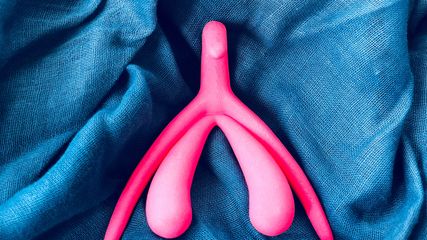
Mental health in the peri- and postmenopause
Author:
Prof. em. Dr. med. Anita Riecher-Rössler
Medical Faculty
University of Basel
E-Mail: anita.riecher@unibas.ch
Menopause is a natural event, which is defined by the final menstrual period and is preceded by many years of “menopausal transition” associated with marked hormonal changes. Although this is a physiological process, it may have a negative impact on women’s physical and mental health. Nowadays, with a life expectancy of around 80 years in many societies, women spend more than one third of their lives in peri-and postmenopause.1 Historically, we are thus faced with a new challenge.
What is menopause?
“Menopause” refers to the last menstrual period, “perimenopause” (“menopausal transition” or “climacteric”) to the period with irregular menstrual cycles prior to menopause through to a year after the last period, “postmenopause” to the years following the final menstrual period. The mean age of menopause is 49 years with a wide variation. Menopausal transition with menstrual cycle irregularities and hormonal changes already starts 5–8 years earlier.2 During these years the ovarian production of estrogens and progesterone decreases, often with strong fluctuations of blood levels, to stop permanently with menopause.
Common symptoms
Common symptoms are hot flushes and night sweats, which affect about 80% of women, insomnia, difficulties concentrating (brain fog), vaginal dryness, dyspareunia, decreased libido, anxiety, and depression.1,3 The symptoms can continue for years and massively influence the quality of life and work performance.
Exploring the influence of menopause on mental health
Research exploring the nexus between menopause and mental health grapples with several hurdles. Older studies often lack precise differentiation between menopause, perimenopause, and postmenopause or had no longitudinal design to explore increase in incidence.1 Interpretation of data is difficult, as mental changes in this period can arise from the loss or rather the fluctuations of sex hormones, more indirectly from vegetative and sleeping problems (domino theory), from psychosocial stressors, or from an interaction of all these factors.
The role of estrogens in mental health
Estrogens play a pivotal role for mental health. Particularly 17-β-estradiol, the estrogen most active in the brain, has neuroprotective as well aspsychoprotective properties and modulates neurotransmitter systems, including serotonin, norepinephrine, dopamine, glutamate, and acetylcholine.1 Clinically it may enhance affective symptoms and cognitive functioning, mitigate stress sensitivity, aggressive and suicidal behavior, and have antipsychotic properties.1
Menopause and mood disorders
There seems to be a two- to four-fold increase of depressive symptoms and even major depressive disorders during menopausal transition. Depressive symptoms have been shown to correlate with hormonal fluctuations, implying that estrogen fluctuations might act as triggers. A history of prior depression emerged as a consistent risk factor for perimenopausal depression. Hormone replacement might be protective.1
Menopause and schizophrenic psychoses
As we have shown women develop schizophrenic psychoses approximately 4–5 years later than men, with a second peak of onsets after age 40. And women in this age group have more severe symptoms and illness coursescompared to men.4With the «estrogen protection hypothesis» we postulated that 17-β-estradiol protects against psychosis, and its loss unveils vulnerability.5
Estrogen replacement
Intervention studies
While hormone replacement therapy (HRT) has traditionally been associated with managing menopausal symptoms,6 it also seems to ameliorate depressive symptoms and major depressive disorders, especially if onset is during perimenopause.1,6–9 It probably works via stabilizing fluctuating estrogen levels.9 There are also studies at odds, but many of those studies were small, started with estrogens long after menopause or used less potent forms of estrogen.10
In women with schizophrenic psychoses, the addition of estrogens to standard antipsychotics may reduce psychotic and depressive symptoms and potentially also cognitive decline.11 Unfortunately, most studies on psychoses have been performed in young women, although the greatest effects would be expected in peri- and postmenopause.
Critical reappraisal of estrogen replacement
Estrogen replacement in peri- and postmenopause has been challenged by several studies, especially the Women’s Health Initiative (WHI) study, because of suspected side effects. However, this study was criticized for methodological flaws, particularly the high age of the women studied, the prophylactic application, and the use of synthetic hormones.1,12 A reanalysis of data could not confirm the first findings, but rather showed benefits when estrogen replacement was started early in a so-called “window of opportunity”.13
If applied in the best mode it obviously can reduce not only menopausal symptoms and osteoporosis, but also depression, cognitive decline, coronary heart disease, and all-cause mortality.1,6–9,12,13
Certainly, contraindications must be considered.1,6–8,12–14 However, in case of therapeutic use potential side effects must be compared to the side effects of psychotropics. It goes without saying that estrogens should only be substituted in close cooperation of psychiatrist and gynecologist, based on an individual risk-benefit assessment and with close monitoring. The final decision must always be taken by well-informed women themselves.
Unfortunately, after the first false alarms based on misinterpretations of the WHI data, professionals and patients now “overestimate the risks and contraindications and underestimate the impact of menopausal symptoms on a woman’s quality of life”.8
Implications for research
More research on indications and contraindications of estrogen replacement for women with mental disorders is urgently needed, especially also on the relative risks of hormones compared to psychotropics or on the best augmentation strategies.
Implications for prophylaxis and therapy
Hormone replacement during perimenopause is a so far underestimated therapeutic option for patients with mentaldisorders. Especially depression with onset in perimenopause might be treated with estradiol. More severe cases also need antidepressants.1
In schizophrenic psychoses, estradiol may serve as an adjunct to antipsychotic medications, potentially permitting a reduction in antipsychotic dosage and its side effects. Menopausal hormone therapy is not officially approved for the treatment of depression in Europe or the USA. But it should be considered to alleviate low mood according to the guidelines of several national and international societies especially in perimenausal women with vasomotor symptoms.6–8
Clinicians might prescribe it based on individual indications such as menopausal symptoms or prophylaxis of osteoporosis. Psychiatrists should have sufficient knowledge to advise their patients and cooperate with gynecologists. To this end they should know the best mode of hormone replacement, i.e., natural 17-β-estradiol applied transdermally (patches or gel). Progestogens must be added for endometrial protection in women with uterus. Here, “body identical” micronized progestogens seem to have the least side effects.1,6,12,14
SERMs
Alternatives such as selective estrogen receptor modulators (SERMs) might also ameliorate symptoms in postmenopausal women with schizophrenia or depression.1,15 However, results so far are inconsistent.
Psychopharmacotherapy
Psychopharmacotherapy in peri- and postmenopausal women should align with established guidelines. Estradiol can be used in a first step or added for augmentation. Special requirements for women should always be considered, such as gender differences in pharmacodynamics and pharmacokinetics or the interaction of medication with sex hormones.1
Selective serotonin reuptake inhibitors (SSRIs) can ameliorate both depression and hot flashes. Their augmentation with estrogens seems especially effective.1 Women with schizophrenia need higher antipsychotic doses in the postmenopause, probably due to estrogen withdrawal.1
Psychotherapy
For women, this phase of life is often burdened with numerous psychosocial stressors. Aging might be realized quite harshly; health problems might arise. Sexual and relational problems might occur. Children might leave the house. And women might feel the need to reevaluate their expectations for life. Gender-specific socialization, gender roles, and gender role stereotypes as well as low self-esteem have often prevented women from pursuing their goals. With all the role changes occurring, they might for the first time realize this. Old suppressed role conflicts might get virulent and must be worked on in psychotherapy. Empowerment and the development of self-confidence are essential.1,16
Psychotherapy in this age group should also pay attention to women’s subjective experience of the menopause, including their physical complaints, their fears and beliefs regarding menopause and the experienced changes, as well as their femininity and sexuality.16 Cognitice behavioral therapy (CBT) has been recommended and adapted for menopause.8,17
Other therapeutic approaches
Education about menopause can empower women. Alternative medicine, though increasingly popular, so far lacks substantial evidence and confersits own risks.1 Women might suffer from manifold physical problems, which should be carefully diagnosed and treated. Often, we see complex interactions between aging, hormonal, and psychosocial changes in women of this age group. Thus, integrating biological and psychosocial treatments tailored to individual needs is vital.
Conclusions
Menopause is a physiological event accompanied by massive hormonal and other biological alterations and often also manifold psychosocial changes. All these changes can obviously interact and trigger or aggravate mental problems and disorders, especially in vulnerable, predisposed women.18
Clinicians should not only use specific psychotherapeutic and psychosocial interventions as well as tailored psychopharmacotherapy, but also consider estrogen therapy. The latter should be prescribed based on individual risk-benefit assessments in close cooperation between psychiatrists, general practitioners, gynecologists, and - most importantly - the well-informed woman herself.
As we continue to unravel the complexities of perimenopausal mental health, additional research is imperative to refine treatment strategies and ensure optimal care for women in this critical phase of life.
Literatur:
1 Riecher-Rössler A: Menopause and mental health. In: Chandra P., Herrman H., Fisher J., Riecher-Rössler A. (eds) Mental Health and Illness of Women. Mental Health and Illness Worldwide. Springer, Singapore 20202 Roberts H, Hickey M: Managing the menopause: an update. Maturitas 2016; 86: 53-8 3 Santoro N et al.: Menopausal symptoms, and their management. Endocrinol Metab Clin North Am 2015; 44(3): 497-515 4 Riecher-Rössler A: Oestrogens, prolactin, hypothalamic-pituitary-gonadal axis, and schizophrenic psychoses. Lancet Psychiatry 2017; 4(1): 63-72 5 Riecher-Rössler A, Häfner H: Schizophrenia and oestrogens – is there an association? Eur Arch Psychiatry Clin Neurosci 1993; 242(6): 323-8 6 Stute P et al.: Management of depressive symptoms in peri- and postmenopausal women: EMAS position statement. Maturitas 2020; 131: 91-101 7 “The 2022 Hormone Therapy Position Statement of The North American Menopause Society” Advisory Panel: The 2022 hormone therapy position statement of The North American Menopause Society. Menopause 2022; 29(7): 767-94 8 National Institute for Health and Care Excellence (NICE): Diagnosis and management of menopause guideline. Published: 12 November 2015. Last updated: 5 December 2019. www.nice.org.uk/guidance/ng23 9 Gordon JL, Girdler SS: Hormone replacement therapy in the treatment of perimenopausal depression. Curr Psychiatry Rep 2014; 16(12): 517 10 Wharton W et al.: Rationale and design of the Kronos Early Estrogen Prevention Study (KEEPS) and the KEEPS cognitive and affective sub study (KEEPS Cog). Brain Res 2013; 1514: 12-7 11 Riecher-Rössler A et al.: Sex and gender differences in schizophrenic psychoses—a critical review. Arch Womens Ment Health 2018; 21: 627-48 12 Langer RD et al.: Hormone replacement therapy - where are we now? Climacteric 2021; 24(1): 3-10 13 Rossouw JE et al.: Postmenopausal hormone therapy and risk of cardiovascular disease by age and years since menopause. JAMA 2007; 297(13): 1465-77 14 Rozenberg S et al.: Menopausal hormone therapy and breast cancer risk. Best Pract Res Clin Endocrinol Metab 2021; 35(6): 101577 15 Herson M, Kulkarni J: Hormonal agents for the treatment of depression associated with the menopause. Drug Aging 2022; 39(8): 607-18 16 Hoga L et al.: Women’s experience of menopause: a systematic review of qualitative evidence. JBI Database System Rev Implement Rep 2015; 13(8): 250-337 17 Hunter MS: Cognitive behavioral therapy for menopausal symptoms. Climacteric 2021; 24(1): 51-6 18 Howard LM et al.: Women‘s reproductive mental health: currently available evidence and future directions for research, clinical practice and health policy. World Psychiatry 2025; 24(2): 196-215
Das könnte Sie auch interessieren:
Zielgerichtete Therapien in der gynäkologischen Onkologie
Rezente Fortschritte der molekularen Krebsforschung führen zur Etablierung personalisierter und auf der Tumorbiologie basierender Therapien. In der gynäkologischen Onkologie sind Hemmer ...
Neue Möglichkeiten der Gebärmuttertamponade bei postpartaler Hämorrhagie
Die postpartale Hämorrhagie (PPH) stellt weltweit eine der häufigsten Ursachen für maternale Mortalität dar. Schätzungen zufolge sterben global jährlich rund 70.000 Mütter an den Folgen ...
Das Bulboklitoralorgan in der gynäkologischen Praxis
Wohl kein anderes menschliches Organsystem kann auf eine ebenso spannende wie auch verstörende Geschichte zurückblicken wie die Vulva mit ihrer Hauptakteurin, dem Bulboklitoralorgan, das ...


